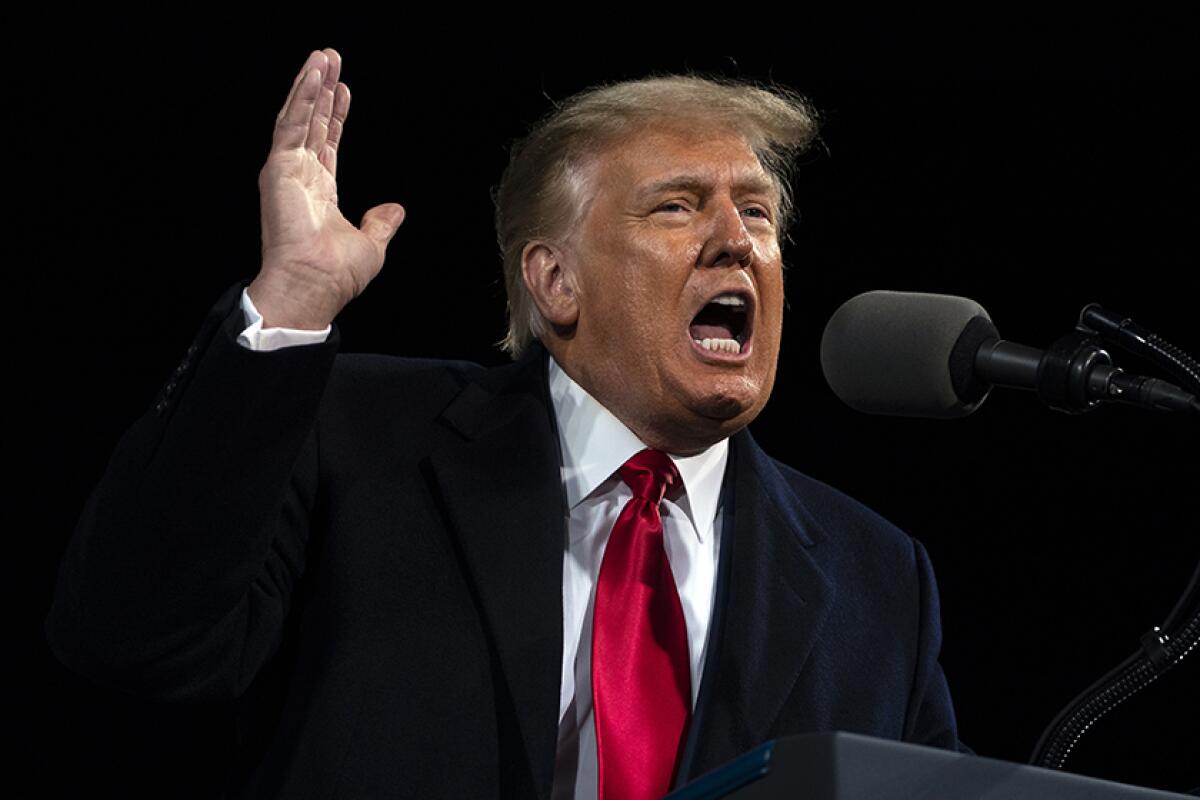Op-Ed: Trump’s formula for building a lasting personality cult

- Share via
Some curse President Trump for bringing the country to near ruin and count the days until he leaves the White House, having been defeated by Joe Biden. Others, including many Republican lawmakers, praise him as the nation’s savior and refuse to acknowledge his loss, seeing him as a victim whose enemies have stolen what is rightfully his.
Whatever Americans’ opinions of him, Trump continues to monopolize national attention. Every day brings fresh cycles of media coverage and new memes and hashtags circulating for and against him.
While Trump has, so far, failed to wreck American democracy, he has succeeded magnificently at building a personality cult of the kind that generations of authoritarian leaders have used to maintain their popularity, keeping elite and grass-roots followers loyal to them no matter what they say or do. Understanding how personality cults work is essential to any assessment of the Trump presidency, starting with his ability to win more votes in 2020 than in 2016, despite spiraling coronavirus infection rates and economic hardship.
For 100 years, strongmen leaders like Trump have found favor at moments of transition, when traditional parties and political systems no longer seem adequate and progress toward racial and gender equality, even if limited, leaves many unsettled.
Often coming from outside politics, these figures forge whatever alliances are necessary to get to power and stay there. Their amoral and opportunistic attitudes explain why they end up with an improbable mix of supporters, with religious authorities, criminals, business elites and homemakers prominent in their bases. Personality cults help the strongman be whatever his followers need him to be at that moment.
It’s no accident that modern personality cults first developed in the 1920s, along with the Hollywood star system, since they share an important quality of celebrity: The object of fascination must seem accessible but also be remote and untouchable.
In the political sphere, this translates into leaders who are acclaimed both as men of the people and as men above all other men — the only ones who have a divine mandate to bring the nation to greatness. Former White House Press Secretary Sarah Huckabee Sanders’ statement that God “wanted Donald Trump to become president” is in this tradition.
Nor it is surprising that many strongmen entered office with experience in the art of mass communication or dissimulation, allowing them to exploit the new media of their day. Benito Mussolini and Zaire’s Mobutu Sese Seko had been professional print journalists, but both excelled at visual communication. Adolf Hitler took voice and hypnotism lessons in the 1920s that served him well during the verbal tirades that made him famous. Italy’s Silvio Berlusconi and Trump had long experience with marketing and television.
While authoritarian rulers are often weak and paranoid characters, their personality cults depict them as men possessed of uncommon physical vigor and toughness. Mussolini, the first to use mass media to build his cult, became a divo for his skill at showing off his often shirtless body on camera. He threshed wheat alongside peasants, wrestled a lion cub and straddled horses and heavy machinery.
Russia’s Vladimir Putin has replicated the formula. Trump, less fit, borrows other men’s bodies to make the same point. In November 2019 he tweeted an image of his head photoshopped onto the torso of Sylvester Stallone’s character from the 1982 film “Rocky III.”
Having a direct communication channel with the public is key to maintaining personality cults. The propaganda strategies used, like rallies, have stayed remarkably the same, even as information mediums have changed. Mussolini used newsreels, Hitler used radio, Berlusconi and Libya’s Moammar Kadafi used television, India’s Narendra Modi uses Instagram (and holograms, as during his 2014 election campaign, to appear simultaneously at many rallies), and Trump uses Twitter, with his misspelled words and grade-school vocabulary playing into his “everyman” persona. Over a century, a paradoxical truth holds: The more skilled the leader is at mediacentric politics, the more his admirers see him as authentic.
Trump has worked hard to build his cult, and it’s doubtful he will let it languish once he leaves the Oval Office. More likely, he will refresh it with a declaration of a 2024 presidential candidacy, allowing him to act as a shadow leader for his base and continuing to use the rallies, tweets (he’s always used his personal account) and other tools of his public persona. The aim would be to keep him in the spotlight, preventing younger, more competent figures in the GOP from emerging as rivals. Trump may be out of office in January, but his personality cult will live on.
Ruth Ben-Ghiat is a professor of Italian studies and history at New York University and the author of “Strongmen: Mussolini to the Present.”
More to Read
A cure for the common opinion
Get thought-provoking perspectives with our weekly newsletter.
You may occasionally receive promotional content from the Los Angeles Times.










